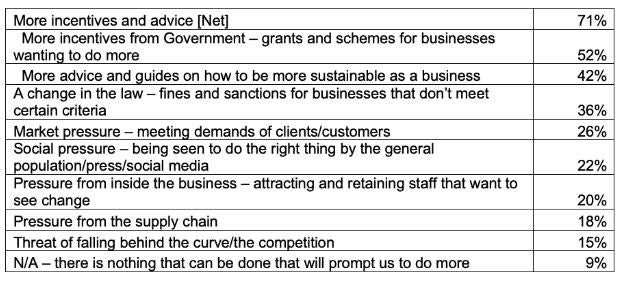
Small businesses would prefer the carrot of greater incentives, advice and support in their efforts to become more sustainable, rather than the stick of a change in the law, according to new research from Novuna Business Finance, as nine in ten respondents admitted they needed more prompts in order to help them become more sustainable (91%).
At a time when the Competition and Markets Authority (CMA) published new guidance to help businesses work together towards achieving environmental goals, after finding that businesses needed more clarity on what is and is not legal when working towards sustainability, Novuna Business Finance asked a representative sample which methods would prompt them to take action on sustainability within their business.
Actions that would prompt small business leaders to do more on sustainability

Seven in 10 feel incentives are the way forward
The results showed that the vast majority (71%) said more support and advice was the best way to encourage more sustainable activity. Over half of the respondents believed that Government incentives were the best option when prompting change (52%). Better advice and guidance on how to become more sustainable was also high on the list, with two-fifths looking for guides on how to improve as a business (42%).
Looking at the responses by the size of the organisation, the proportion of leaders of smaller businesses favouring an incentive-led approach was significantly higher: 75% of smaller businesses vs 67% of larger businesses (50 employees or more).
Existing pressures are already enough of an incentive
The research revealed that 40% of respondents felt that current pressures were enough of an incentive to prompt action. More than a quarter said customer demands already mean they are forced to take action on their sustainability, while 22% said social pressure more generally meant they wanted to be seen to do the right thing. One in eight (15%) said they were conscious they did not want to fall behind the competition on this issue.
Other pressure cited included coming from within the business itself (22%), particularly if this involved attracting and retaining staff that wanted to see change.
How well do you really know your competitors?
Access the most comprehensive Company Profiles on the market, powered by GlobalData. Save hours of research. Gain competitive edge.

Thank you!
Your download email will arrive shortly
Not ready to buy yet? Download a free sample
We are confident about the unique quality of our Company Profiles. However, we want you to make the most beneficial decision for your business, so we offer a free sample that you can download by submitting the below form
By GlobalDataFinally, with the ISSB recently voting for mandatory disclosure of scope 3 emissions from businesses, 18% felt that their supply change would provide enough of a prompt for them to improve their operational practices to be more sustainable.
Just a third keen for additional laws and fines
The results showed that around a third (36%) of small business leaders felt introducing additional regulation would be the most effective way of driving action on sustainability. Interestingly, when it came to those businesses keen to see a change in the law, the research found that bigger businesses were more likely to vote for a law change than small enterprises (44% vs 32%).
Joanna Morris, head of insight at Novuna Business Finance, said: “From current and previous research, it is clear that businesses want to do more on sustainability – this is a given. Prompting businesses to do as much as they can to tackle climate change will involve a combination of factors – pressure from market forces, incentives and advice, and regulation. There is no silver bullet. However, from this research, we can see clear preferences for smaller businesses – pointing to areas where leaders may respond best.
“Certainly, as the issue of climate change becomes more prevalent, more and more businesses are realising the scale of the challenge to be more sustainable. Resources and advice are still few and far between, and the sooner businesses have the means to understand their own situation, and how they can change meaningfully, the better. Novuna Business Finance is working with small businesses predominantly in the manufacturing, construction and agricultural sectors to support them to become more sustainable with the right resources to do it.”
Asset finance new business grew by 12% in April 2023 – FLA







